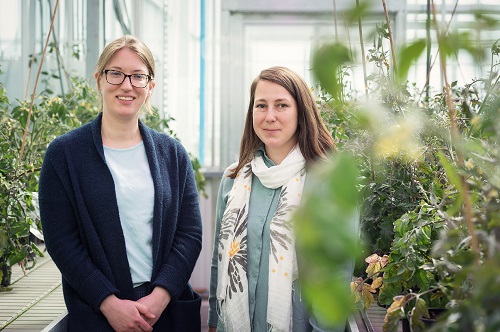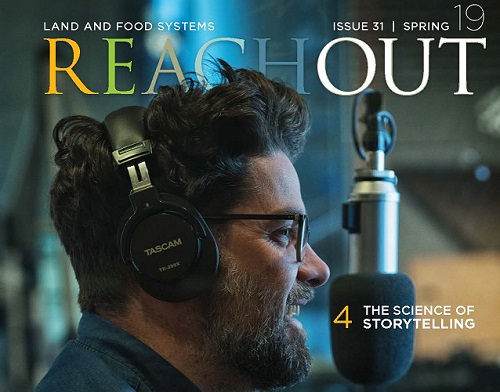Thinking Small in the Face of Climate Change

Juli Carrillo (photo, right side) and Cara Haney are looking to some of Earth’s smallest organisms to help plants adapt to rising carbon dioxide (CO₂) levels. Carrillo and Haney have launched a two-year project funded by the George Weston Seeding Food Innovation Grant, investigating how beneficial soil microbes can help plants deal with the global rise in CO₂.
“CO₂ seems like it should be beneficial to plants since it is the building block of sugars generated in photosynthesis. More CO₂ means bigger plants,” says Haney, Assistant Professor with UBC’s Michael Smith Labs. “But research has shown that this increase in plant biomass corresponds to a decrease in plant quality and health.”
Rising CO₂ levels affect plants in a myriad of ways: decreasing their ability to take up micronutrients from the soil, increasing plant susceptibility to insects and diseases, and lowering overall nutrient content for people who consume these plants.
“Lower plant quality means insect pests need to eat more just to survive,” says Carrillo, Assistant Professor in the Faculty of Land and Food Systems. “This is bad for crops, as is drought and other environmental stressors. What’s promising is that we’ve found that specific microbes in the soil can help plants respond to these stressors. Our goal is to determine if these microbes can also rescue the plants from the detrimental effects of elevated CO₂.”
Carrillo and Haney are working with the model plant, Arabidopsis, and its close crop relatives broccoli and canola. They are using a beneficial soil microbe, Pseudomonas fluorescens, to tease apart genetic traits that can help in addressing the effects of CO₂ on plant health.
“Our goal is adaptation,” Carrillo explains. “We are looking at factors across the food chain and across trophic levels above and below ground. This includes plants, insect pests and their natural enemies, and plant-soil associated microbes. I think that’s what makes our project unique. In this way we better understand the consequences of elevated CO₂ and potential ecological management options for crops.”
The researchers want their findings to be applicable for agriculture so they are working both in the lab and in the field to adapt microbes capable of surviving when cultivated in a farm setting.
“Many attempts to use microbes that show promise in the lab have not worked when you put them in the field,” says Haney. “We are trying to understand why certain microbes are beneficial, and by working directly with industry partners and farmers we hope to develop solutions that can have a viable impact in the industry.”
“We’re hoping that eventually, we can help offer these microbial solutions to farmers engaging in both organic and conventional farming,” adds Dr. Haney.
Tagged with: 2019, Faculty, Sustainable Agriculture and Environment
